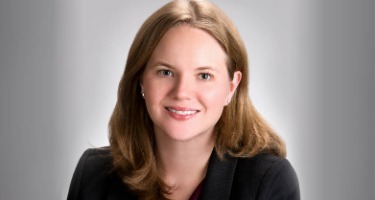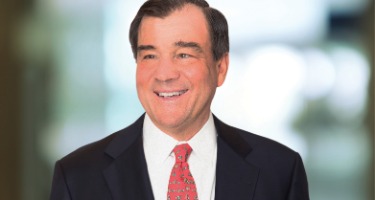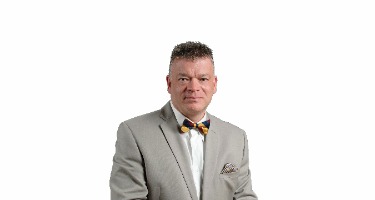A Q&A with Advisory Board member Colleen Tracy James of Mayer Brown.
What does a typical day look like for you?
I’m lucky to be the mother of a daughter who is 15 months old. I love spending time with her in the mornings. Then I’m off to work. I commute on the train and immediately start working. I sort through email and respond to clients while staying on top of the latest changes in the law and the legal profession. When I get to work, I hit the ground running working on my clients’ matters so that they may achieve their legal and business objectives. It is really important to understand what challenges my clients are facing in the real world and to understand their business as I work on their legal issues. The day is pretty fast-paced, and I usually work into the evenings. I feel it’s important to always be accessible to my clients. Work-life balance is also important; it’s not always easy, but a priority in my life.
What can you tell me about the Hatch-Waxman Act and your role in litigating against generic pharmaceutical companies? Are there related cases you were involved in that you’d like to discuss?
I have been practicing law for about 20 years now. I’ve spent the majority of my career handling patent litigation for life sciences companies, and a lot of that work has involved the Hatch-Waxman Act and working on behalf of branded companies against generic companies. I’ work diligently to protect my clients’ patents because I’ve seen from the inside what it takes to come up with these life-saving, life-altering drugs. I’m passionate about protecting people who’ve spent a lot of time inventing drugs that help us every day.
Since about 2008, I’m very proud to say that I’ve been working with Gilead Sciences. Gilead has transformed the face of HIV infection and AIDS. I’ve been fortunate to represent them and defend their patents. I was lead counsel on several of those cases and served as first chair at one of the trials involving Gilead’s HIV drugs.
What do you think are the greatest challenges of patent litigation?
The greatest challenge is taking complex, scientific information, which I love and really get into, and making that accessible and understandable to a judge or a jury who may not love science as much or at all. I think that’s really the art of it.
What are some of the ways that you increase that accessibility?
By telling a story. Storytelling is a form of communication that, I believe, judges and juries appreciate because it’s easier to understand rather than having a lawyer reciting facts and leaving it up to them to figure out how those facts fit into the story. It’s more engaging and makes it more interesting for a judge or jury who has to sit through a trial and listen to evidence that’s mostly about complicated science. Also, you have to really think about and be considerate of your audience and provide them with the important facts and try not to use technical scientific jargon if it’s unnecessary.
I read your interview with Forbes regarding social media recommendations for Big Pharma when it comes to the FDA. You expressed that pharmaceutical companies need to form content strategies. What do you think is an effective content strategy for pharmaceutical companies to implement?
Pharmaceutical firms should develop clear and decisive social media advertising policies. Also, companies should decide who in the organization should be responsible for content that is advertised on social media. I also suggest that companies have a compliance officer tasked with making sure there’s a policy in place and that it’s being complied with and updated with evolving FDA guidance. This is very important, because although we do not have a lot of guidance from the FDA on advertising pharmaceutical products on social media, one thing we do know from the FDA’s guidance is that companies must state the risks and the benefits; it has to be a balanced statement. When you’re training employees about how to respond on social media you have to, as part of the messaging, include all information about the drug, not just the benefits.
Since Trump’s election, the science community has expressed feelings of being under siege. In April, scientists and supporters had their March for Science, shouting “Save the EPA” as well as “Save the NIH.” As a litigator with a BS in biology who works very closely with scientists and innovators, do you have any thoughts on how we can preserve scientific endeavors and continue to facilitate the resources necessary for these organizations to continue?
Well, I think that organizations such as pharmaceutical companies aren’t going to be dissuaded by anything going on in the political arena, from continuing to look for new and innovative ways to help improve the lives and health of people.
If we see restrictions on certain types of research, for example, stem cell research, an administration can make it impossible for pharmaceutical companies to engage that kind of research. That, of course, would be unfortunate. The rest of the world is investing a lot of time in stem cell research—we are already lagging behind because of policies of former administrations.
I think the main problem arises with agencies and institutions that depend on government funding through grants. For example, if grant money for NIH is constricted, that will definitely impact their research on areas like cancer. Also, universities rely on grant money, and if the government restricts that money, then we could see contraction in university scientists’ ability to conduct fundamental research, which would be very unfortunate because many key discoveries that are the basis for life-saving, life-changing drugs come out of universities. We must keep the pressure on the government to continue funding such organization as the NIH and grant programs. Otherwise the private sector will have to subsidize the shortfall.
Can you tell me about your role at the National Association for Female Executives and what being involved with the organization entails? Additionally, would you like to discuss what the Women in Law Empowerment Forum is?
I feel very strongly about empowering women. WILEF (Women in Law Empowerment Forum) is a great organization, which has really made an important impact in the advancement of women at BigLaw. WILEF has created the “Gold Standard.” To reach this standard, firms must meet certain criteria, including specific percentages of women equity partners and women in management positions. WILEF truly empowers women.
What do you think have been some of your keys to success and/or what strategies have you implemented to be as successful as you are?
One is that you have to stay true to yourself and your principles. You have to decide who you are and what you believe in, and you have to stick with it and not compromise your principles. You must remain your authentic self.
I’ve always been that way; I haven’t changed my personality or my beliefs or how I do things to conform. Even with my clients: if I don’t agree with something they believe they should do or don’t think it’s the best course of action for them, I’m honest with them. I tell clients from the first moment we begin working together that the one thing I can always assure them—in addition to working hard and doing a great job—is that they will have complete honesty. And I expect that from them. Being honest, authentic kind, and really caring about your work, clients, and colleagues are characteristics that lead to success.
I had the privilege of serving as a managing partner at my prior law firm. In that role, I wanted every person who worked at the firm to come to work and feel they were being given the opportunity to be the best they could be, whatever their particular job, goals, or endeavors were. I’ve run a lot of large litigation teams, and I truly believe in decision by consensus. I want to hear from every person on my team, and no matter how junior or senior, I expect them to come to meetings with ideas and have a voice.
At the end of the day, having diverse perspectives and input helps you consider all the angles and potential pitfalls before you decide how to go forward. That’s what I find gets the best product for your client. That includes client input because they have their own perspective, strategies, and goals they have to meet. After all, they know their business better than anyone.
Is there something you’d like to comment on that we didn’t touch upon?
I really believe that the legal profession is still in flux, but it’s still a great profession. We need to embrace the changes that we are facing because, at the end of the day, if we face these challenges head-on and we adapt, the profession will be even greater for the next generations.
It’s really important that we listen to younger generations of lawyers because they’re really smart and capable. They’ve grown up in the electronic age, and they have a lot of value to add to both firms and clients.


























